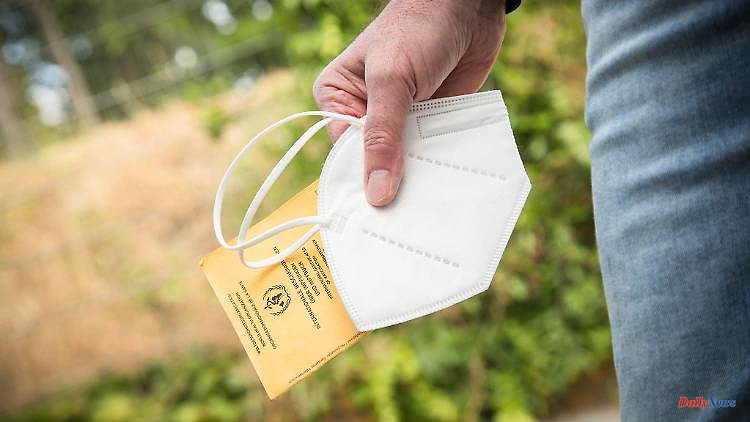Ironically, at the time of travel, the number of corona cases continues to rise. Many younger people who are not previously ill are therefore asking themselves: Should I get boosters for the second time now? Why the STIKO has not generally recommended this so far.
Above all, the Omicron subline BA.5 is giving Germany an increasing number of corona cases. Is it better to get vaccinated again to be able to enjoy the summer more carefree? Although new vaccines adapted to Omicron are expected in a few months? That's what some people are asking themselves, whose most recent spade against Sars-CoV-2 was a long time ago. So far, the Standing Vaccination Commission (STIKO) recommends a second booster only for some groups, including people with suppressed immune systems, nursing home residents, people over 70 years of age and staff of medical facilities. Based on the total population, according to data from the Robert Koch Institute (RKI), 6.5 percent have received a second booster vaccination, and among people aged 60 and over it is almost one in five.
Janosch Dahmen, Greens health politician, last week brought up a new examination and, if necessary, timely expansion of the STIKO recommendation: According to Dahmen, people who are younger than 70 years of age and especially those with risk factors could also enter before autumn received further vaccinations against both corona and influenza.
What does STIKO say about this? As with any medical measure, there must be a justified medical indication behind a general recommendation for a further booster vaccination, says STIKO chairman Thomas Mertens. The assumption "a lot helps a lot" cannot be the guiding principle here. "Politicians' willingness to act is an essential element of policy-making, but the resulting actions must, as far as possible, be verified before they are implemented." Mertens explains that there should be data and knowledge on a number of points. The point is what the adapted Covid-19 vaccines that are already available and those in development can do in the current situation: How well do they protect against infection and disease from all virus variants known to date? And what further developments in variants can be identified at all?
The virologist explains that there is currently insufficient, reliable data on these two points in particular. "The availability of the data is a prerequisite for a well-founded new vaccination recommendation for everyone and must also be taken into account when politicians are "willing to act". In addition, it must still be considered whether there are new aspects in the safety of the vaccines and how the immunity of those who have been vaccinated and/or those who have recovered develops.
Other experts are also backing STIKO. The Secretary General of the German Society for Immunology, Carsten Watzl, says that he currently sees no need for a general recommendation for a fourth vaccination. For people with a healthy immune system, the protection against serious illness is still very high more than six months after the third vaccination. Anyone who wants to can be vaccinated a fourth time - even without falling under the STIKO recommendation - in order to bring the immune protection back to the level it was shortly after the third vaccination. This does not harm and one does not obstruct anything in relation to a possible fifth vaccination with a vaccine adapted to Omikron.
"However, with a general recommendation, I'm afraid that many people will get the impression that I have to be vaccinated every six months in order to be protected. And that's not true and could lead to vaccination fatigue," says Watzl.
"I think that the recommendations of the STIKO are very balanced and appropriate," explains the immunologist Andreas Radbruch, scientific director of the German Rheumatism Research Center in Berlin. He sees a fourth vaccination now for everyone critically from several points of view. One of them: The fourth vaccination with the currently available vaccines protects "only very imperfectly against infection and infectivity". Radbruch refers to Israeli data relating to protection from Omicron. He assumes that the protection is also rather short-lived.
Radbruch also emphasizes that the second and third vaccinations already provided very good protection against serious illness and death. A fourth vaccination with the previous vaccines is probably only a little, but could possibly even be an obstacle to reacting optimally to new vaccines and virus variants later. In a British study in the journal The Lancet, the authors mention a possible ceiling effect: the benefit of a fourth dose may be less in people who already have strong immune responses from recent infection or vaccination. The effect can depend on the type and dose of the vaccine, for example, but further analyzes are necessary.
As other experts have recently emphasized several times, the falling antibody levels in the blood in the period after the vaccination does not mean that you are at the mercy of Sars-CoV-2 without any defense. "It is absolutely normal, healthy and desirable if the antibody level falls during the course of an immune reaction, because this is how the plasma cells that make the best antibodies are selected," explained Radbruch. These plasma cells would then "recruited into the bone marrow, where they provide us with the protective antibodies for years and decades."












